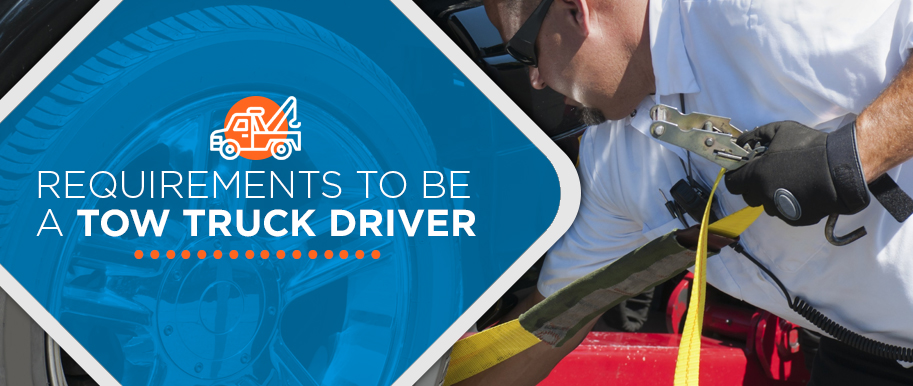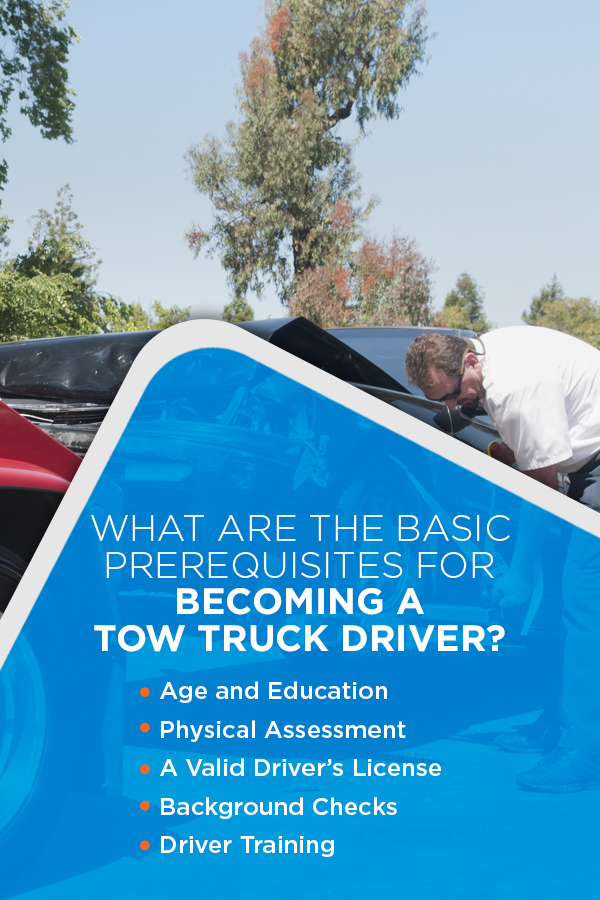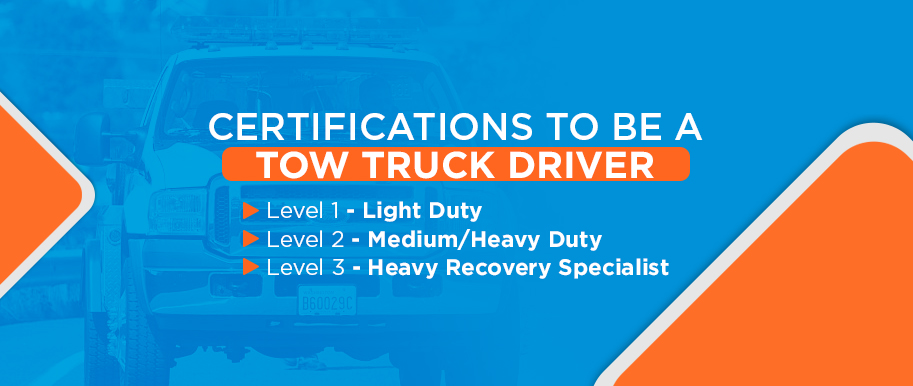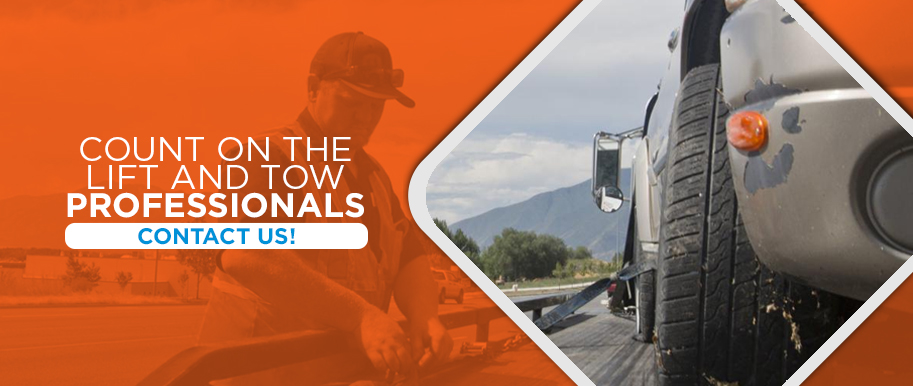
If you aspire to become a tow truck driver, you should know there’s more to it than hauling broken-down vehicles.
This job requires a blend of specialized training, certification, licensing and experience to succeed — as well as interpersonal skills and sufficient physical fitness. Being a tow truck driver takes hard work and dedication. Many drivers would be stranded on the road without towing professionals.
If you want to know how to become a tow truck driver, the following guide contains handy FAQs showing you what it takes.
Table of Contents
- What Are the Basic Prerequisites for Becoming a Tow Truck Driver?
- What Licensing and Certifications Do I Need to Be a Tow Truck Driver?
- Are There Different Types of Tow Trucks I Can Operate?
- What Are the Typical Attributes and Skills of a Tow Truck Driver?
- How Do I Get Started?
- How Much Do Tow Truck Drivers Make?
- Can I Start My Own Towing Business?
- What Licenses Do I Need to Start a Towing Company?
- Contact the Lift and Tow Professionals to Learn More
What Are the Basic Prerequisites for Becoming a Tow Truck Driver?
Towing professionals help with various situations, including abandoned cars, vehicle breakdowns, car accidents, illegal parking, impoundment and roadside assistance. The job may involve traversing and navigating all sorts of roadways, from windy country roads to jam-packed highways to steep hills and mountains to bustling city streets.
Regulations related to being a tow truck driver vary from state to state in the U.S. Most need you to pass a series of tests and licensing programs. Once you pass, you will then be eligible to operate a tow truck. Contact the U.S. Department of Transportation if you’re unsure what your state calls for. They can point you to the specific laws and guidelines for your state. You may need certifications for both states if you work in an area that closely borders another state.
Basic stipulations of becoming a tow truck driver include:
- Age
- Education
- Physical assessments
- Driver’s license
- Background checks
- Proper training
Please review the following details to see if you meet the prerequisites for becoming a tow truck driver.

1. Age
You must be at least 18 years old to operate a tow truck. However, many companies require several years of experience on the road — making the typical age to begin a tow truck driving career between 21 and 25.
2. Education
A truck driver’s education requirements largely depend on their potential employers rather than any established standard. It is not a requirement to have a specific education, but many employers like to see at least a high school diploma or a GED.
3. Physical Assessment
Towing is a demanding job. Companies want to know that you have what it takes to perform this position’s physical duties and be safe on the road. Before being hired, you may be required to take a physical exam to ensure you’re in good health, including a hearing and vision test and a drug screening.
You should be able to lift and operate heavy equipment such as tow chains and tires. Can you work in various weather conditions? Can you drive in different elements like snow, rain, hail and wind? What about shoveling out a car that’s snowed in? A tow truck job requires mental and physical endurance.
When it comes to vision and hearing, can you see long distances and navigate through tricky traffic patterns? Do you have good eyesight for short and long distances to hook up cars and maneuver equipment? Excellent hearing is also essential when working at an accident site or other busy area.
Some employers may even require that you take a drug test to become a tow truck driver. They’re looking to see if you’re drug-free since heavy machinery is a central component of the profession.
4. A Valid Driver’s License
You must have a state-issued driver’s license and a driving record that shows your reliability and safety on the road. Do you have a history of speeding, traffic violations or DUIs? Your file will show employers how you handle the road and if you practice safe driving.
5. Background Checks
Sometimes, your employer may run a criminal background check because you have the potential to be in charge of moving people’s valuable possessions. While the car itself is expensive, the items inside may be valuable as well. You must be a trustworthy tow truck driver to move cargo from one place to another safely. Some states may require you to get fingerprinted.
6. Driver Training
Some drivers train at vocational schools or local community colleges. Specialized courses in towing and recovery combine fundamental knowledge with practical training to prepare you to be a safe and efficient tow truck driver.
New tow truck drivers can also learn skills while on the job through apprenticeship or shadowing. Learning from skilled drivers through on-the-job training is one of the best ways to learn about a company’s policies, safety procedures and strategies. While there may not be any educational background needed, you can gain experience and then seek certification. From there, your certification verifies that you learned the essential skills to advance your tow truck driving career.
You can also communicate with other tow truck operators to find out what companies and firms offer the best training in your area. If you move from one towing business to another, each will train you as a new employee so that you understand their policies. Even when you complete your training, licensing and certification goals, continue taking classes and state-specific educational courses to keep yourself current.
What Licensing and Certifications Do I Need to Be a Tow Truck Driver?
If you meet these basic prerequisites, what next? Licensing and certification are the next stages in pursuing your tow truck driving goals.
Licensing
While no law states you need a license to become a tow truck driver, the federal law — according to the United States Department of Transportation — says you must hold a commercial driver’s license, CDL, before towing more than 26,000 pounds.
While licensing depends on various state regulations, most states require a CDL license before you can obtain a towing job — regardless of how much they tow.
You can acquire a commercial driver’s license through in-person training, plus a written exam. Once you pass the driver’s test, you have a massive competitive advantage when looking to be hired. You also become a more versatile candidate.
Certifications
When ready to take the next stride in your tow trucking career, you can obtain your certification in person or online through the Towing and Recovery Association of America (TRAA). The certification program is available for those who already have experience in towing. TRAA creates national standards for tow truck drivers, and the training covers aspects like customer service, safety, equipment, truck maintenance and incident management.
Three levels of certification exist:
- Light-duty towing (Level 1): In the first stage, you must meet all your state’s driving requirements for light-duty training. You will also need 90 days of tow truck experience within the last five years. Level one certification includes a test with 100 questions. You will receive the certificate within several days of passing the exam. With level one certification, you can operate a truck with a Lift and Tow hidden wheel lift.
- Medium- or heavy-duty towing (Level 2): The second certification program is the middle level, which entails one year of employment as a heavy or medium-duty tow trucker. Other prerequisites include one year as a recovery operator and a commercial driver’s license. You also need level one certification. Level two’s test has a written section on theoretical knowledge and an oral segment to examine how you would respond to realistic situations.
- Master tower (Level 3): The final level is to become a heavy recovery specialist with the ability to operate heavy-duty trucks. You will need a commercial driver’s license, including endorsements and a level two certification. Two years of professional experience is also necessary. The exam has a written segment to test your theoretical awareness and an oral portion like level two.
Lift and Tow suggests continuing your certification until you reach the third and final tier. It will help you become a well-rounded tow truck driver who’s capable of responding to a variety of jobs. Not sure which license you need? See CDL requirements for tow truck drivers.

Are There Different Types of Tow Trucks I Can Operate?
There are three types of tow trucks that tow truck drivers typically operate. While you often have one assigned to you, it’s important to know the limitations and operations of each if you start working your way up to more complicated tasks.
1. Conventional
Also known as a hook and chain truck, conventional towing vehicles are what most people think of when they picture a tow truck. The truck wraps its chains around a vehicle’s axle and frame while the back arm lifts the car to where the back or front two tires lift off the ground. With the vehicle in neutral, you have an easy towing rig.
Conventional towing machines are less popular than other types because the chains can scratch car paint. However, they are a popular choice when accidents occur. A conventional solution cannot be used to tow all-wheel drive vehicles because the towing device can damage the driving system.
2. Wheel Lift
Like conventional tow trucks, the wheel lift — or full float truck — has a metal yoke that raises one of the car’s axles, lifting either the front or back tires off the ground. However, instead of chains, hydraulics suspend the truck or car to prevent damage.
3. Flatbed
Also referred to as rollback trucks, flatbeds are ideal for expensive vehicles or vehicles with excessive damage that prevents the wheels from rotating. They use a hydraulic system to lower and raise a car or truck bed onto the ramp.
What Are the Typical Attributes and Skills of a Tow Truck Driver?
It all comes down to one final question — what does becoming a tow truck driver take? Plain and simple, it’s hard and dirty work. Yet, if you have the right personality type, it can be quite rewarding. Here are some traits and skills that will serve you well if you become a tow truck driver.
- Patience and calm: In any situation, patience and the willingness to support people in need are at the forefront of your duties. A person who relies on your assistance will often be frustrated, on a time crunch, worried, angry or distraught. Their circumstance will often seem helpless until the tow truck driver arrives and saves the day. It’s crucial to listen and empathize with your customers because we have all been there — and it’s never fun.
- Excellent communication: Tow truckers must be able to communicate effectively with customers, car owners, call operators and law enforcement. Clear communication will ensure you get the correct information to the right people. An outgoing personality can also serve you well, as a friendly demeanor and a dose of levity can defuse a tense situation.
- Cool under pressure: When you get called to respond to an accident, there is potential for exposure to unpleasant sights. You may have to deal with people who are traumatized, stunned or emotional in other ways. Handling high-stress situations can be rewarding, primarily if you can provide critical aid to people in dangerous situations.
- Ability to handle various conditions: You don’t always get to choose the time, place or situation. So, prepare yourself for anything. You may even experience working in an unfavorable location like a busy highway or deserted road.
- Basic mechanical skills: Another useful ability is knowing how different cars and trucks work. Understanding how different makes, models and years of vehicles work and how to fix them can help you gain an advantage in your tow lifting career. Sometimes, you may be asked to assist someone who needs help fixing a car or changing a tire. And think about how many people get locked out of their cars every year or need help jumpstarting a battery. You may even have to help with connecting loose wires, replacing spark plugs and adding fuel.
- Flexibility: Being a tow truck driver means you’ll have a job every day of the year with full 24-hour days. Cars, trucks and other vehicles need towing at all hours of the day and night, allowing you to work late at night, mid-day or early morning.
How Do I Get Started?
To start your career as a tow truck driver, apply to tow companies, service stations or auto salvage businesses. You can also look at state employment services, newspaper ads and internet job sites.
How Much Does A Tow Truck Driver Make?
In 2024, a typical tow truck driver’s salary in the United States was $20.25 per hour. Of course, a lot of factors can influence your salary, including:
- Experience
- Certifications
- Where you live
- Willingness to work overtime
Can I Start My Own Towing Business?
Yes — if you want to start your own towing business, Lift and Tow can help translate your goals into reality. Let us talk with you one-on-one about what you’re looking to accomplish. Our experts will help you determine which towing product best fits your application and budget.
Any of our repo wheel lift solutions can transform your vehicle into a full-service tow truck. Available in various models, our wheel lifts can be installed on three-quarter-ton trucks as well as bigger pickups. They attach to the underbody of your vehicle and can easily be concealed when you’re not working. We will help you choose between our towing kits.
Once you have a tow truck ready at the turn of your key, you can start building your business by filling out the appropriate paperwork for your state. If you want to be a single operator, that is an option. But if you build a startup, you will also want to consider how you’ll grow your fleet, hire employees and make your mark on the community.
What Licenses Do I Need to Start a Towing Company?
Before starting your towing business, be sure to research your area. Towing may be the perfect business opportunity for you — yet it requires careful planning and compliance with a variety of licensing and regulatory conditions. Consider consulting with a legal professional who can advise you on local jurisdiction requirements. Many states and cities mandate specialized licenses and permits, which could include:
- A business license
- Towing license or permit
- Vehicle registration and licensing on all tow trucks
- Adequate insurance coverage
- Other permits, such as a consent to tow permit or oversized vehicle permit
Once you have all the necessary licenses and permits, you can operate legally and successfully in the towing industry.
Contact the Lift and Tow Professionals to Learn More
Before you begin, review OSHA requirements for tow truck drivers.
At Lift and Tow, our tow systems offer fast and efficient loading, incredible durability and versatility when towing various kinds of vehicles. Our solutions help you avoid buying an entire towing rig and allow you to convert your truck into a multipurpose vehicle.
Check out our wheel lift units including the Super Series, 5-Series and Z-Series wheel lifts to get started.
